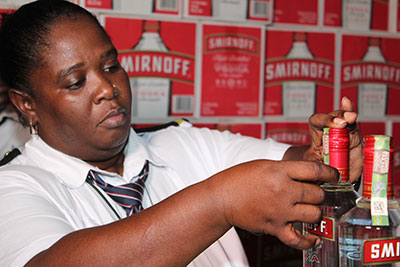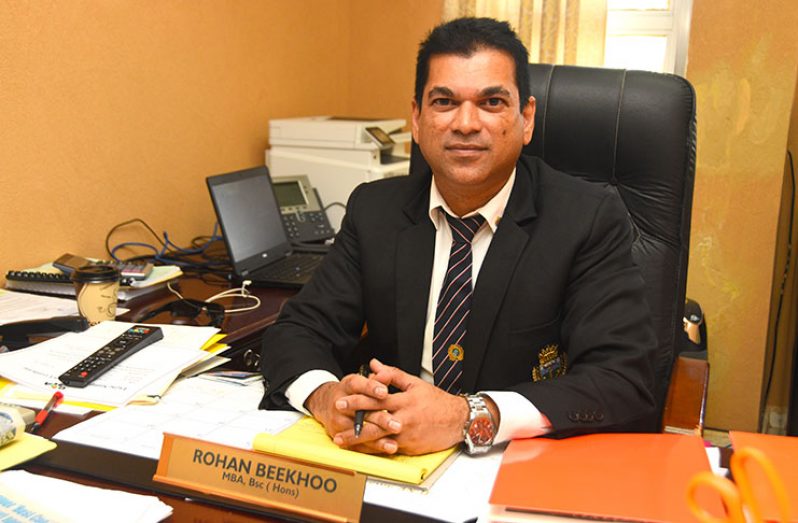…as GRA rolls out excise stamps on imported alcohol, cigarettes
THE Guyana Revenue Authority (GRA) is aiming to make a massive dent in the illicit trade of alcohol and tobacco products with the implementation of a secured digital excise stamp solution.

The anti-smuggling initiative currently being rolled out in Region Four (Demerara-Mahaica) is expected to safeguard the billions of dollars in Excise Tax being lost to the illicit trade. Customs Officers, operating out of GRA Customs, Excise and Trade Operations (CE&TO), are currently visiting the premises of importers, businesses and persons selling alcohol (excluding beer) and tobacco products as they initiate the stamping process. Only imported alcohol and tobacco products are being stamped at a fee of $16 and $8 respectively per product.
In an exclusive interview with the Guyana Chronicle, GRA Deputy Commissioner–Excise Stamp and Environmental Levy, Customs, Excise and Trade Operations, Rohan Beekhoo said smuggling of illicit products continue to be a major problem for the revenue authority–confirming that billions of dollars in taxes are being lost to the illicit trade.
Recognising that it does not have the capacity to effectively monitor the country’s vast borders where these products are being brought in illegally, Beekhoo said GRA in 2015 partnered with Canadian Bank Note – a Canadian security printing company to develop a secured digital excise stamp solution.
Approximately two years after, GRA is rolling out the anti-smuggling initiative using the Excise Stamp in accordance with Regulations 215 (3) of the Customs Act, Chapter 82:01. “The level of compliance from the importers of these products has been relatively low. So by starting this project, this stamping process, we will start to realise our true potential…But we can project that (our losses) it is in the billions,” he explained.
According to the deputy commissioner, the stamps, which will be placed on every product that falls within the two categories, cannot be easily forged. “These stamps are highly secured. They have security features comparable to our bank notes, and so counterfeiting them would not be easy. Counterfeiting them would be next to impossible,” he warned. Using a unique software system, the revenue authority is equipped to trace every stamp. “When the stamp is applied to a product either the alcohol or the tobacco, it is going to say to our customs officers that this product has paid the correct import duties, excise tax and the correct VAT,” Beekhoo explained.
Currently, imported alcohol and tobacco products are being stamped but importers and retailers must be able to provide the required documents and supporting evidence to verify that the items were legally imported into Guyana. “So we are stamping imported hard liquor like the Johnny Walkers, the Vodkas, the wines, and so on, not beer or Shandy, and we are stamping the cigarettes, cigarettes per pack and hard liquor per bottle,” he noted.
The Deputy Commissioner added that Customs Officers have already started visiting the importers and suppliers of the targeted products. “By law they are required to provide their stocks to customs for verification. Once we would have verified the inventory, we would supervise the placement of the stamps. The onus is on the importers or the suppliers or the retailers to have persons who we will show how to place the stamps and then that will be supervised by customs,” he further explained. He made it clear that the revenue authority will allow commercial entities to single-handedly stamp their products, although emphasising that the process will be supervised by the Customs.
As a follow-up mechanism, Monitoring and Compliance Officers will be armed with handheld scanners on the ground to determine if a product was stamped, if the stamp was genuine and if it was applied to the correct product.
“If it (the product) is not stamped, then we will basically deem it as illicit or illegal and they would have to prove to us that this product came in the country legally. That is why it is so important to get the current inventory stamped as well, once they were legitimately imported,” Beekhoo noted.
Failure to have the targeted imported products stamped could result in defaulters being fined in keeping with the Customs Act. “There are penalties ranging from $10, 000 up to three times the value of the goods. So as I said, it is tied to the Customs Act. The provisions of the Customs Act would be invoked for those not complying.”
According to the Deputy Commissioner, the initiative is a welcomed one especially for legitimate importers and suppliers who have been short-changed by smugglers. “Under normal circumstances you may be correct, it’s a new initiative it comes at a cost but the legitimate importers, most of them, do actually welcome this measure because their products have been competing with the smuggled products, in many cases most of their products cannot sell, so by incurring that small cost for the stamps and reducing the size of the illicit market, then their products can now sell,” he explained.




.png)









